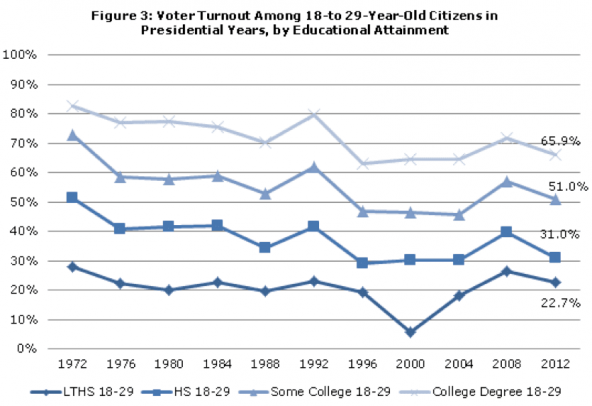In our "
Bridging Differences" blog discussion on
Education Week, Deborah Meier and I have been discussing the meaning of democracy. We both agree that such discussion is important today, when democracy's meaning has been dramatically reduced - and we both agree that democracy is vastly more than elections!
We also have agreement that democracy involves tradeoffs and compromises, and agree on principles such as rough equality in power and knowledge. I like the comment of William Hastie, the first black federal judge, that democracy is a journey, not a destination.
We also have some differences worth exploring.
For one thing, Meier stresses self-governance as the heart of democracy, and, related, highlights the idea of leisure time ("the trouble with socialism is that it takes too many evenings,"
quipped Oscar Wilde, who meant it resolves around meetings. People say the same about democracy). In contrast, I find compelling the argument of Victor Hanson in
The Other Greeks. Hanson argues against the dominant scholarship which assumes that Athenian public life represented the democratization of aristocratic leisure. Such a view is associated with the ideal of "civic virtue," which holds that citizens should put aside their interests to pursue a common good.
Hanson marshals a good deal of evidence to suggest that in fact Athenian democracy grew out of the breakup of the large landed estates and the rise of small farms. The gritty, everyday challenges and disciplines of such farming necessitated cooperative labors on common projects. It wasn't a matter of putting aside interests, but finding that interests sometimes needed to be pooled through cooperation. It was a political process, in the sense of politics we've been discussing. And the discipline of learning to tie one's interests, especially in work, to the long range health of the city turns out to be a key democratic habit.
Hanson's argument complements my research on the roots of democracy across the world in communal labors, which also suggests what the classicist Josiah Ober has shown: democracy in its Greek meaning did not mean a decision making structure, majority rule (see my last blog, "
What Is Democracy?"). Rather for the Greeks it meant the capacity or power to act to shape the public world.
Put differently, democracy doesn't only involve participating in decision making. It means
creating communities. The concept of citizen as co-creator is a revolutionary challenge to contemporary societies, worth much more discussion.
Democratic practices of communal labor, what we call public work, can be found in every culture long before the term democracy came into existence. Cooperative public work across differences of economic rank and status, sometimes others like ethnicity, has an element of democratic decision making that distinguishes it from conscripted labors organized and controlled by outside powers, whether emperors or nobles or kings. Public work is self-organized cooperative effort by a mix of people which produces something of lasting common benefit (cultural as well as material). It generates the sense that democracy is something people make, not simply participate in. Water systems, common spaces, public institutions, and also cultural products, from songs and dance to schools, are all examples of the many "commons" whose creation and sustenance are foundations of a democratic way of life.
Public work existed in settings (like medieval Europe) where formally people were ruled by kings and immigrants brought these traditions to America - a wellspring of our democratic culture. I describe the ways in which public work generates civic agency, collective power, in an essay in
Political Theory, "
Constructive Politics as Public Work."
Another ancient democratic practice is deliberation. Nelson Mandela in his autobiography
Long Walk to Freedom argues that deliberation of (male) villagers of all backgrounds and ranks is the heart of democracy - even though the chief made the final decision. These practices of deliberation, often around a great tree in the middle of villages, are an ancient feature of African civic life.
Deliberation and public work feed into the transdisciplinary field called Civic Studies, with a
website at The Jonathan Tisch College of Citizenship and Public Service at Tufts University. Civic Studies is based on concepts of agency and citizens as co-creators of communities at different scales.
Another concept in Civic Studies is self-governance of common resources like forests, irrigation systems, fisheries and others, which turns out to be essential to their survival, according to the research of Elinor Ostrom, one of our co-founders, her husband Vincent, and an international network of collaborative researchers. Olstrom won the Nobel Prize in Economics for this research in 2009. Her Nobel lecture, "
Beyond Markets and States," can be taken as a brilliant case for Civic Studies. She contrasted citizen governance of common resources, where local communities set rules and sanctions and apply them, with control by outside forces ("markets and states"). Formal governance structures often are complex, what Ostrom calls "polymorphic," with many levels, but strong citizen involvement in their governance is essential for their survival.
After we worked together with several others to form Civic Studies and before her untimely death in 2012, we had many conversations about the relationship between governance of common resources and the work that creates and sustains them. Ostrom was enthusiastic about the concept of public work and terms I had discovered for its different forms, in cultures across the world.
Civic Studies also includes other traditions of theory and practice such as critical theory, community organizing, popular education, and interpretative social science, which recognizes the importance of different kinds of knowledge and different ways of knowing, not simply scientific or academic knowledge.
Civic Studies is full of implications for how we organize and practice democracy education, at every level. It also is full of resources for democracy in a time of trial.

